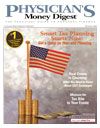Publication
Article
Physician's Money Digest
How to Choose the Right Brokerage House
Author(s):
Smart Money
Choosing the right brokeragehouse is one of thekey decisions you have tomake to manage yourinvestments well. Hightransaction fees and other costs can eataway your returns over the years, andpoor service can eat up a lot of yourtime, causing a great deal of frustration.magazine compiles avery informative annual survey andanalysis of brokerage house costs andservices. The latest one was publishedin their August issue. You can look itup at www.smartmoney.com/mag.
Let me add to this survey mythoughts on what you should look forto make the right choice for yourself.
Your Options
You have three broad options tochoose from. First, there are the fullservice,major brokerage houses suchas Merrill Lynch and Morgan Stanley.Second, there are discount brokeragehouses like Scottrade and TD Ameritrade.And third, there are the giantmutual fund companies like Fidelityand Vanguard, which also offer mutualfunds from other companies andaccess to most other securities marketsas well as bank CDs, etc.
You can also get a broad range ofinvestment advice from companies inthe first and third categories. But my recommendationis: Get your investmentadvice by paying a visible fee and makesure your advisor does not have anyconflict of interest. Getting everything inone package may look attractive, butoften it is not in your best interest.
Selection Criteria
Start by thinking through and makinga list of services that are importantto you. In my view, most investors haveno business buying individual stocks,whether based on their own research oron recommendations from the researchdepartment of a brokerage housethrough a broker. So access to researchis not important. What is important isaccess to a good selection of low-cost,no-load mutual funds from all the goodmutual fund companies at low transactioncosts.
Being able to set up investments intoand out of mutual funds using dollar-costaveraging is also important,because most of the time that is howyou should buy or sell mutual funds.Some places handle these more efficientlythan others. These days youmay also want to buy some exchange-tradedfunds. So being able to buy themat low commissions is important.
How about fixed-income securities?My recommendation is that youshould buy only US Treasury bonds,including Treasury Inflation-protectedSecurities directly, provided your portfoliois large enough. Buy bond mutualfunds for all other types of bondsincluding municipal bonds; otherwise,your transaction costs will be very highno matter which brokerage house yougo to. Some major houses like MerrillLynch will be able to get you bonds atno transaction costs at the time of theirinitial public offerings. But most peoplewill be better off not buying anylong-term individual bonds even at nocost. It will be best if you can do mostof these simple transactions over theInternet. You do not need fancy capabilitiesfor trading stocks and options.
Then there is the issue of service.Because you are not looking for investmentadvice and research recommendations,what you need is prompt actionwhen something goes wrong.
I have saved a very important, butoften overlooked, criterion for last. Agood brokerage house must offer greatrates on both taxable and tax-exemptmoney market funds. A lot of yourmoney may sit in those for long periods,and since investors pay little attentionto this criterion, most brokeragehouses have chosen to make a lot ofextra money for themselves by offeringpoor to mediocre returns on theirmoney market funds. To my mind, anycompany that tries to take advantage ofyou that way automatically disqualifiesitself from deserving your business.
In case you are curious, most of myown and my clients' money is atVanguard. For smaller accounts I useScottrade. But these may not be thebest choices for you. (I have no relationshipwith either company beyondbeing their client.)
Chandan Sengupta, author of The OnlyProven Road to Investment Success (JohnWiley; 2001) and Financial Modeling UsingExcel and VBA (John Wiley; 2004), currentlyteaches finance at the Fordham UniversityGraduate School of Business and consults with individualson financial planning and investment management. He welcomesquestions or comments at chandansen@aol.com.
